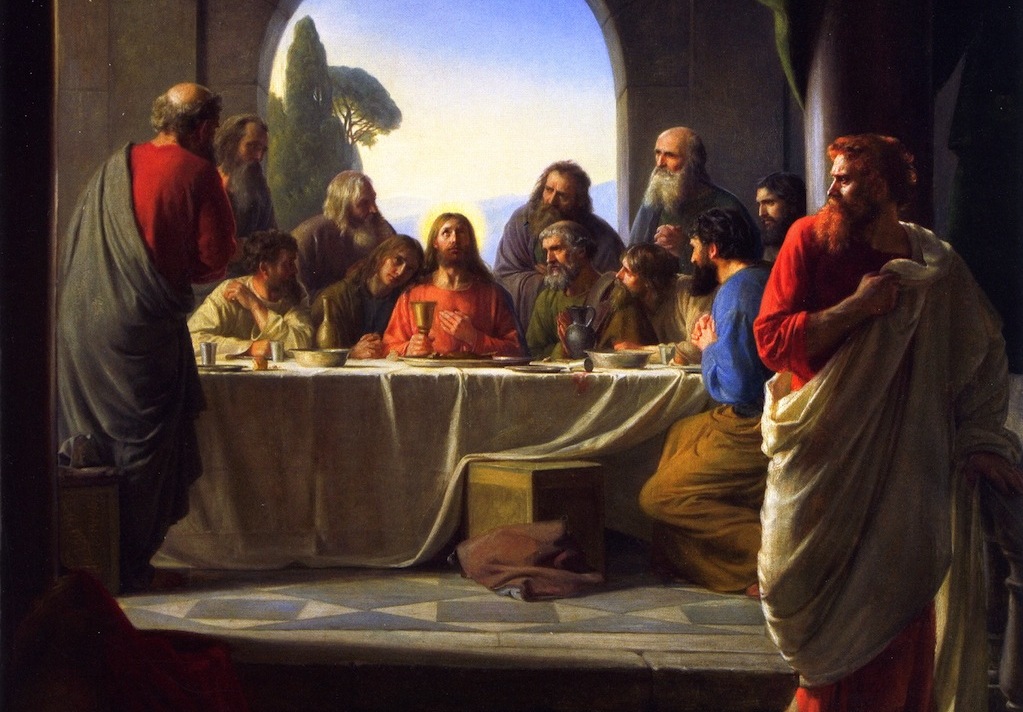
Jesus said that one of you is going to betray me and the Twelve is clean, though not every one of them. He was referring to Judas. The uncleanness of Judas, to whom Jesus alluded by his remark, was not in his feet but in his heart.[1]
This unclean one, the betrayer is at the Last Supper. Jesus invited him to the table and washed his feet too. And he gave a piece of bread after having dipped it in the dish.
At first this looks like a device on Jesus’ part to expose Judas. Actually, it is the exact opposite.In the Orient, it was the custom to eat seated or squatting about a common bowl. The participants dipped with fingers or folded bread to obtain what they wanted. When guests were present, the host, if he wished especially to honor one of them, would fold a piece of bread spoon-like, dip it into the dish and, securing some choice morsel, and hand it to that guest as a special favor. This did Jesus unto Judas. It was thus no effort to expose Judas. It was an attempt to shield him.[2]
It was Jesus’ last effort to win Judas. It was as if he said: ‘Judas, tonight you are my most honored guest. Tonight, you are my dearest friend.’[3]
However, Judas could not bear this love of Jesus Christ. He went too far to turn back. He was damned, not by any action of Jesus to expose him, but by the love of Christ to save him.[4] Judas finally forsook the last exhortation of love of Christ. Why did he forsake this love?
Because he could not comprehend the love of the Lord, all the acts of the Lord would have been like mockeries and nonsense. His own frustrated ambition, greed, and dishonesty drove him further and further away from Christ.[5] At the end, he rejected the love of Christ and departed to the path that has no point of return. But Judas had no excuses. He was chosen by Christ to be a disciple. He had become a disciple of his own free will. It was by his own choice he became a traitor.[6]
“As soon as Judas had taken the bread, he went out. And it was night” (v. 30).
Though he was offered the bread of love, he turned it down. He fled into the blackness of spiritual death.[7] His heart was too distanced from the Lord. Therefore, he departed from the upper room of the bright light where the radiant truth of the Lord is being proclaimed and disappeared into the pitch-black night. There it is perpetual night.[8] This night is the dark night of his soul.
“What are you willing to give me if I deliver him over to you?” So they counted out for him thirty pieces of silver (Matthew 26:15).
That night, Judas left to betray Jesus. It is a very sorrowful and tragic story. Hester H. Cholmondeley speaks in his short poem:
Still as of old
Men by themselves are priced –
For thirty pieces Judas sold
Himself, not Christ.[9]
Judas priced himself and ultimately sold himself as he sold Christ. Each of us, though able to stand by the grace of God, is free to fall by himself because of our free will. Though we may be with him, if we do not comprehend Jesus and do not know his love, we too may sell ourselves as we sell the Lord in a cheap price just like Judas. Though there is only one way to stand, there are myriad ways each of us can choose to fall.[10] “So, if you think you are standing firm, be careful that you don’t fall!” (1 Corinthians 10:12).
[1] Merrill C. Tenney, John: The Gospel of Belief, An Analytic Study of the Text (Grand Rapids: Wm. B. Eerdmans Publishing Co., 1948), 200.
[2] Quimby, John, The Universal Gospel, 177.
[3]Quimby, John, The Universal Gospel, 177.
[4]Quimby, John, The Universal Gospel, 177.
[5] Phillips, Exploring the Gospel of John, 254.
[6] Phillips, Exploring the Gospel of John, 254.
[7] Quimby, John, The Universal Gospel, 177.
[8] Marrow, The Gospel of John, 240.
[9] John C. Maxwell, Developing the Leader Within You (Nashville: Thomas Nelson Inc, 2005), 45.
[10] Marrow, The Gospel of John, 227.